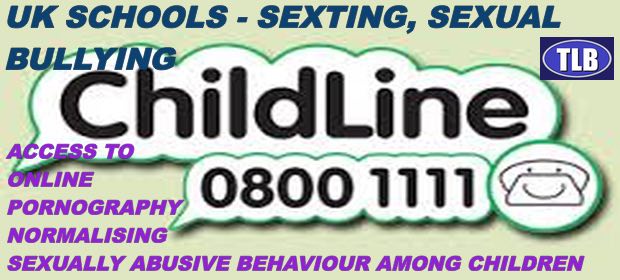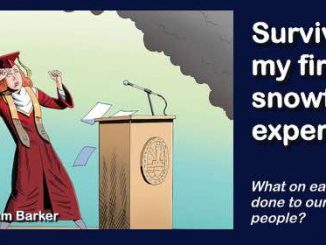
Report submitted to MPs says sexual harassment in schools is not always recognised for what it is
By Karen McVeigh
Senior police officers are seeing an escalation in sexting offences in schools, according to a report submitted to MPs.
In its evidence to a Commons select committee, published this week, the National Police Chiefs’ Council (NPCC) warned that sexual harassment was not always being recognised for what it was in the classroom and pupils did not understand the meaning of consent.
The escalation in sexting among children was confirmed by the National Society for the Prevention of Cruelty to Children (NSPCC). In the charity’s written submission to the women and equalities committee, it reported a 15% increase in ChildLine counselling sessions for sexting, compared with the previous year. The “sexting” advice page is the most viewed on the ChildLine website, it said.
Recent research by the University of Bristol and University of Central Lancashire found that 41% of English schoolgirls aged 13-17 years had experienced sexual coercion of some sort, including rape.
The NPCC highlighted the availability of online pornography and the absence of sex and relationship education in schools as driving factors in altering the behaviour of young people. It called for sex and relationship education to be part of the curriculum.
“How do they learn about sex and relationships if the school curriculum doesn’t cover it and their parents/carer are not equipped to teach them?” it said.

“They have found an available way to find out; the problem is the extreme version [pornography] that they are viewing will be affecting their judgment about what normal sexual behaviour looks like.”
It warned: “Parents, schools and the curriculum are behind the curve in terms of young people online.”
However, the NPCC stressed that it would encourage schools to deal with “low-level offending” themselves and that a young person would not automatically receive a criminal justice outcome, even if police record a crime.
It called for more “safer school partnership officers”, currently employed by 50% of police forces, to deal with sexual violence and other safeguarding issues in schools, as these roles had been cut in some forces because of austerity measures.
It said that in one case, after a safer school officer from Sussex gave a session on consent with year 11 pupils, “a girl approached her at the end and told her that she now understood that what had happened to her was rape”.
In its evidence to the committee, the NSPCC said it had provided 1,392 counselling sessions via ChildLine for sexting or being sent or receiving a sexual or indecent image of a minor via a mobile phone or website in 2015-16, an increase of 15% since the previous year. The charity provided a further 1,126 sessions where children had raised concerns about being exposed to sexually explicit online images or content.
It said children had got in touch with ChildLine after experiencing inappropriate sexual touching and verbal threats in the playground, toilets, changing rooms and in even the classroom during lessons. They also got in touch after receiving harassing texts and online messages pressurising them into online sexual activity, it said.
In its seven-page submission to the committee on sexual harassment and violence in schools, the NSPCC said: “Preliminary findings from yet-to-be-published NSPCC research show that online abuse impacts young people to the same degree as offline sexual abuse, with the majority of the study group exhibiting severe or very severe depression and anxiety while also demonstrating moderate to high levels of shame, stigma, betrayal.”

It concluded: “Leadership is needed at all levels to tackle the issue. The government has begun to make moves to address this by referencing the need for a ‘whole school approach’ to prevention of abuse in schools in national proposals. It must go further however by mandating PSHE [personal, social, health and economic education] in all schools, while schools must incorporate innovative approaches.”
Earlier, the Commons inquiry, chaired by the Tory MP Maria Miller, took evidence from pupils. One sixth-form female pupil, only known as Pupil C, said: “The thing is that they don’t see it as harassment. They just see it as being with their friends, having fun, calling girls sluts – stuff like that. So whereas the girl may feel upset or less confident, they see it as: ‘I’m just having fun with my friends if I slap a girl’s bum.’ I’m a sixth former and you don’t see it as much, but you still see the younger ones laughing about slapping a girl’s bum, calling her a slag and things like that. But they don’t see it as harassment, so if a teacher says: ‘What are you doing?’ and tells them to stop, they are just like: ‘I’m just playing around, Miss.’ They don’t see it as a bad thing and I think that is where the problem starts.”
On Tuesday, the inquiry was told by a panel of experts that children as young as four should be taught about sexism and harassment to counter sexual bullying in the classroom.
Data published in September last year revealed that 5,500 sexual offences were recorded in UK schools over a three-year period, including 600 rapes. A 2014 survey by Girlguiding UK found that 59% of young women aged 13-21 had faced some form of sexual harassment at school or college in the past year.
************
ER recommends other articles by the Guardian
About the author
Karen McVeigh has been a senior news reporter for the Guardian since December 2006. Before that, she freelanced for the Times following a five-year stint as The Scotsman’s London correspondent




